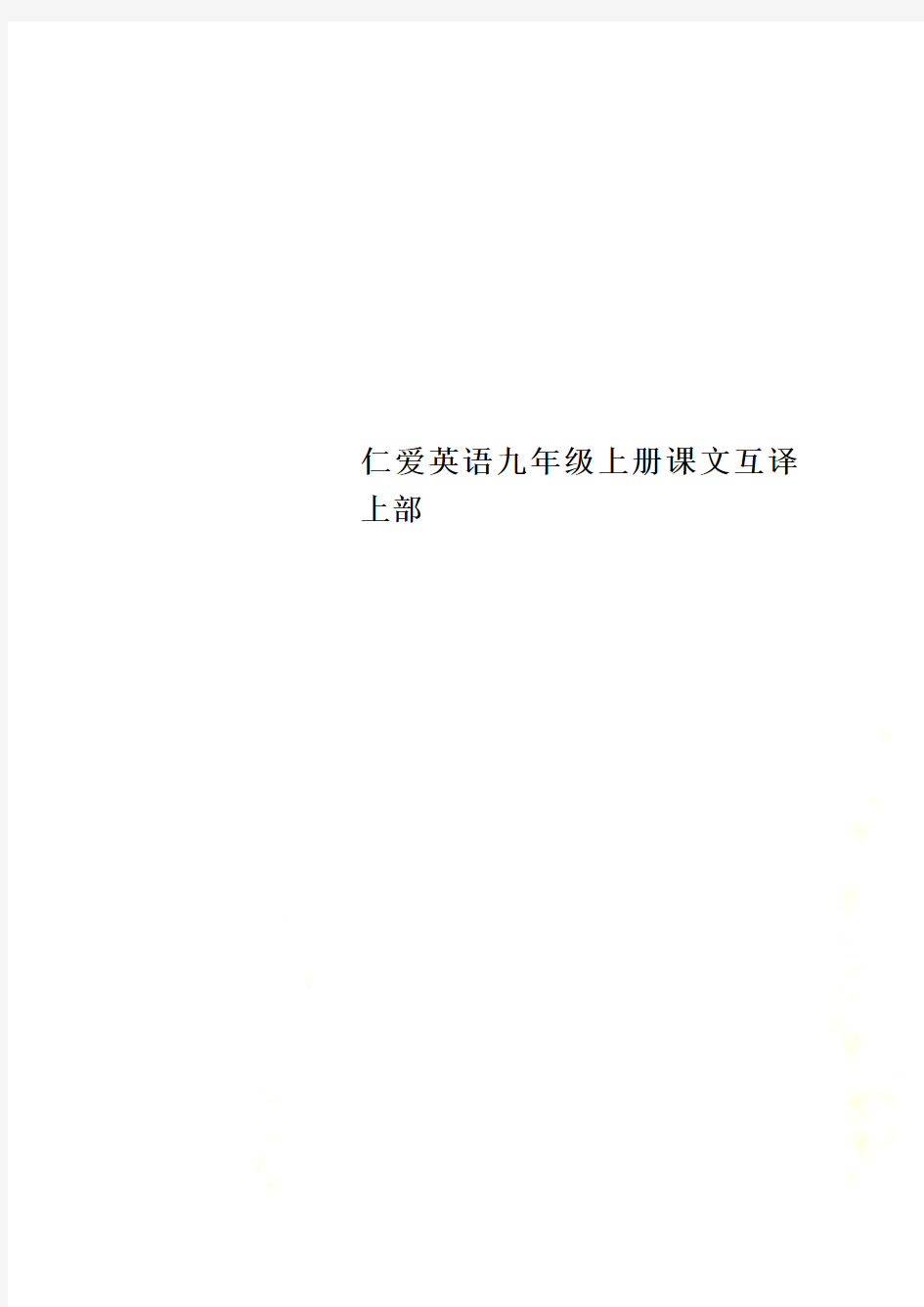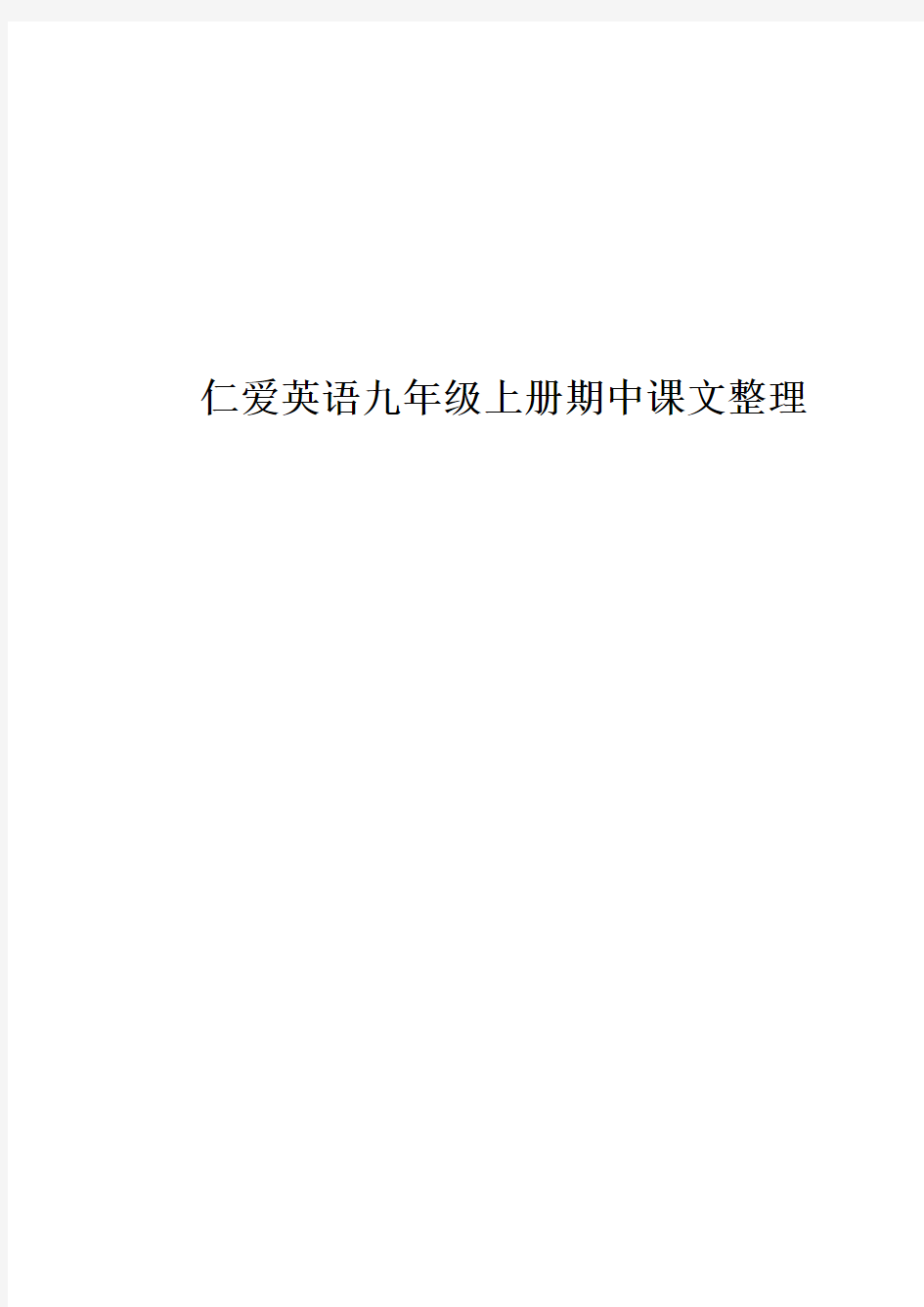仁爱英语九年级上册课文互译上部


仁爱英语九年级上册课文互译上部
仁爱英语九年级上册期中课文整理
仁爱英语九年级上册期中课文整理
九年级仁爱英语上册U1T1课文翻译
九年级仁爱英语上册U1T1 Section A 课文翻译
话题1:我的家乡变得越来越美丽了
My hometown has become more and more beautiful.
1a:(在一个长假后,康康很高兴会见了他的朋友)After a long holiday, Kangkang is happy to see his friends 康康:你好,简,你在暑假玩得开心吗?
简:是的,你怎么样?
康康:还不错,丽塔,你刚从家乡回来,你的旅行怎么样?简:很棒,我在印度到过我家附近的很多地方。那里已经发生了很大的变化,我的家乡已经变得越来越美丽了。你到过了哪里,简?
康康:我跟父母到了黄山,它是一个美丽的地方。但是那里人太多了,以致我找不到一个合适的地方拍照。你到过哪里,康康?
简:我到了一所英语暑假学校去提升我的英语。顺便问一下,玛丽亚哪里去了?
康康:她去古巴当一名志愿者去了,明天她将返回来。康康:Hi, J ane. Did you have a good summer holiday? 简:Yes. What about you?
康康:Not bad. Rita, you have just come back from your hometown. How was your trip?
简:Great. I went to many places near my home in India.
Great changes have taken place there and my hometown has become more and more beautiful. Where have you been, Jane?
康康:I have been to Mount Huang with my parents. It's a beautiful place. But there were so many people that I couldn't find a proper place to take photos. And where have you been, Kangkang?
简:I have been to an English summer school to improve my English. By the way, where's Maria?
康康:She has gone to Cuba to be a volunteer and she will be back tomorrow.
简:听!上课铃声响了。
Listen! There goes the bell.
九年级仁爱英语上册U1T1 Section B 课文翻译
1a:
康康:你好,玛丽亚!在这个暑假期间你参加了一些志愿者活动,对吧?
玛丽亚:是的,我在一这残疾少年之家当一名志愿者。康康:爽!你为残疾少年打扫过房间吗?
玛丽亚:是的,我做过。
康康:你喂养过他们饭吗?
玛丽亚:不,我没有。但是我为他们做了饭菜。
康康:多么美妙的经历啊!
玛丽亚:是的,那确实是。我从那里学到了很多东西,尽管我没有时间去旅游,但是我仍然感到很愉快。
康康:Hi, Maria! You have taken part in some volunteer activities during summer holidays, haven't you?
玛丽亚: Yes, I have been a volunteer in a disabled children’s home.
康康:Cool! Have you cleaned rooms for the disabled children?
玛丽亚Yes, I have.
康康:Have you ever fed them?
玛丽亚No, I haven't. But I have cooked for them.
康康:What a wonderful experience!
玛丽亚Yes, it really was. I've learnt a lot from it. Though I had no time to travel, I still felt very happy.
2a:
丽塔:康康,我打算写一篇关于全球青少年的文章,你能告诉我一些关于过去中国青少年的事情吗?
康康:当然,我奶奶告诉我从前大多数的孩子过着艰苦的生活。
丽塔:是那样的吗?你能详细地描述它吗?
康康:好的,在过去,很多家庭都是大家庭,而且贫穷,
父母亲不能给予孩子们一个教育。
丽塔:哦,那么大多数孩子们是怎样度过他们的童年的?康康:为了帮助供养他们的家庭,他们不得不去当童工,他们整天整夜地工作,从来没有饱食过。
丽塔:如今青少年怎么样呢?
康康:现在我们的国家迅速地发展了,政府给贫困家庭以支持,所以孩子们能够得到良好的教育。
丽塔:哦,他们是幸运的。
Rita: Kangkang, I’d like to write an article about teenagers around the world.Could you please tell me something about Chinese teenagers in the past?
康康: Sure. My granny told me that most children had a hard life in before.\
丽塔:Is that so? Can you describe it in detail?\康康:Well, in the past, many families were big and poor.Parents couldn’t afford an education for their children.
丽塔:Oh, then how did most children spend their childhood?
康康:In order to help support their families, they had to be child laborers. They worked day and night and never had enough food to eat.
丽塔:What about teenagers nowadays?
康康:Now our country has developed rapidly. The
government gives support to poor families, so children can get a good education.
丽塔:Oh, they're lucky.
九年级仁爱英语上册U1T1 Section C课文翻译
1a :我的关于北京的报告
大家好!我是康康。我的奶奶生活在北京40多年了,她亲自见证了北京的变化。
在二十世纪六十年代,道路狭窄,没有很多的环形路,城市生活条件差。
通常,一个大家庭被挤在一个小房子里。
很多家庭没有足够的食物,只有少数孩子有机会接受良好的教育。
生活太艰难了,以致人们没有时间和金钱去享受业余活动。人们通过信件和电报与远方的朋友亲戚保持联系。
自从改革开放以来,中国得到了迅猛地发展,越来越多的环形路出现了,北京的建筑正变得更高大更明亮。
人们的生活条件改善了很多,有各种各样的食物和衣服供选择。
人们能享受多种业余活动,孩子们不仅能在现代化的学校学习,而且能在网络上学习。
此外(更有甚者),通讯正变得更容易更快捷------人们能使用电话、手机、传真机、网络等等。
北京取得了快速地进步,它已经成功地举办了2008年
